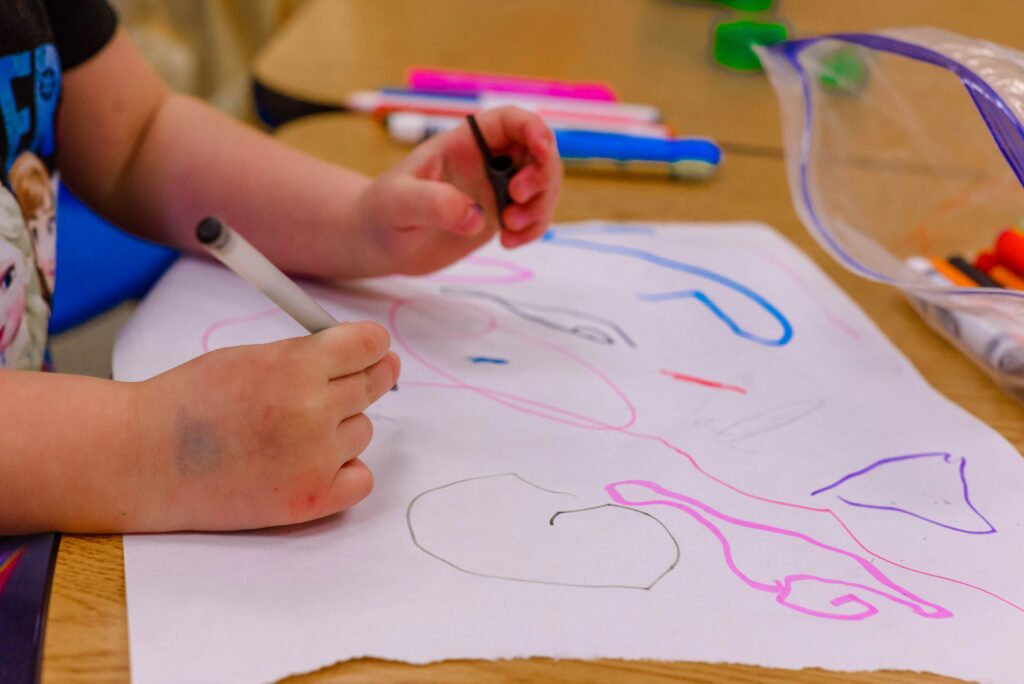EECERA Conference 2025 – Guest Blog # 25: A mindful pedagogy
Posted 21st August 2025
One of a series of short blog posts by presenters who will be sharing their work at the upcoming annual conference in Bratislava, Slovakia. Any views expressed in this post are those of the author(s) and do not necessarily reflect the official stance of their affiliated institution or EECERA.
Using realist action and participatory approaches to develop a mindful pedagogy to support speech, language and communication development in early childhood settings
by Kate Russell & Kimberely Bartholomew, University of East Anglia, United Kingdom

Photo by Erika Fletcher on Unsplash
Based at the University of East Anglia (UEA), the Little Minds project explores how mindfulness can be meaningfully embedded in early years settings to support young children’s speech, language and communication (SLC), engagement, and wellbeing. As a team of researchers and educators in early childhood and mindfulness, we are excited to be sharing our work at EECERA!
Why Mindfulness, Why Now?
Recent reports have highlighted a concerning rise in the number of children starting school with poor speech, language and communication skills (Public Health England, 2020). These challenges, compounded by the long-term effects of the COVID-19 pandemic, have emphasised the need for responsive and developmentally appropriate approaches that can be embedded into the rhythms and relationships of early years practice.
The Little Minds approach addresses this need. Rather than positioning mindfulness as a separate activity, we have drawn on the research literature and the professional experience of our content experts to develop a model that integrates mindfulness principles and practices into everyday provision, routines, and adult–child interactions. In this way we focus on how educators can be more mindful rather than only doing mindfulness in specific moments. Our work recognises the central role of adults in shaping children’s environments and communication experiences, and the power of mindful relationships in supporting the development of children’s focus, bodily awareness, emotional regulation, and self-understanding.
How Can Mindfulness Support SLC Development?
Our approach is informed by research which indicates that mindfulness-based interventions can enhance children’s executive function (EF) skills—such as working memory, attentional control and cognitive flexibility—which, in turn, form the foundation for language and communication development (Flook et al., 2010; Zelazo & Lyons, 2012; Ursache, Blair & Raver, 2012). Mindfulness practices have also been associated with improvements in emotion knowledge, wellbeing and behaviour regulation in young children (Thierry et al., 2016), making them especially relevant for early years practitioners working in increasingly complex educational and social contexts.
Crucially, we are also responding to critiques of some interventions that fail to consider the diverse lived realities of young children and early years educators. Rather than seeking simple causal claims, we are looking at how mechanisms of change are activated in different settings—acknowledging the complexity of early childhood education and care environments. As such, the Little Minds approach was co-constructed with practitioners and is designed to be adaptive, relational, and sensitive to context.
Methodology
Using a realist methodology (Pawson & Tilley, 1997) and principles of participatory action research, we investigated what works, for whom, in what contexts and why, and used this to co-construct the Little Minds approach.
This involved several iterative stages; an evidence synthesis which developed an initial programme theory. We then implemented and evaluated the approach in two early years settings, following 10 children across a 10-week implementation period.
From Research to Practice: What We’re Doing
Our project includes:
- Professional development training for early years educators
- A practical companion handbook explaining the theory and application of the Little Minds approach
- A suite of mindful pedagogical resources to support everyday interactions and continuous provision
- A realist-informed evaluation of the project in nursery and reception class settings across Norfolk
Findings
Emerging findings and case studies from the project will be shared during our symposium. These include examples of how children’s capacity to attend, describe their feelings, and take part in sustained shared thinking has been supported through mindful adult modelling and adjustments to the learning environment. These changes have led to observable changes in children’s SLC and emotional wellbeing.
The Little Minds project is ultimately about being with children in ways that are attentive, curious, responsive and nonjudgmental. As we continue to research and refine this work, we look forward to learning alongside educators, researchers, and leaders across the sector who share our commitment to developmentally respectful, emotionally attuned, and evidence-informed practice.
What to expect from our symposium
Dr Kate Russell, Dr Kimberley Bartholomew, Mrs Eleanor Milligan, and Dr Lois Ferguson will share with you the development of the project from the Realist Review, through to the design of the Little Minds Approach, and outcomes from its implementation in two early years settings. We will also share with you some of our resources that we developed for the project itself (e.g., The Mindful Explorer book to help children understand the research process, The Little Minds Handbook providing the 10 week scaffolded programme, and our innovative communication prompts that supported educators in their work). You’ll also have the chance to take away infographics about the project and our case study stories of the children we worked with.
Kate Russell & Kimberely Bartholomew will present work referred to in this blog in Symposium Set E8 (Wednesday, the 27th of August). (Schedule liable to change; please refer to final programme for details).
Meet the research team
Dr Kate Russell: Kate.Russell@uea.ac.uk
https://research-portal.uea.ac.uk/en/persons/kate-russell
LinkedIn – linkedin.com/in/kate-russell-95b2b956
Dr Kimberley Bartholomew: K.Bartholomew@uea.ac.uk
https://research-portal.uea.ac.uk/en/persons/kimberley-bartholomew
LinkedIn – linkedin.com/in/kimberley-bartholomew-a57a93147
Mrs Eleanor Milligan: E.Milligan@uea.ac.uk
https://research-portal.uea.ac.uk/en/persons/eleanor-milligan
LinkedIn – linkedin.com/in/eleanor-milligan-08b31238
Dr Lois Ferguson: Lois.Ferguson@uea.ac.uk
https://research-portal.uea.ac.uk/en/persons/lois-ferguson
LinkedIn – linkedin.com/in/dr-lois-ferguson-ab4159204
